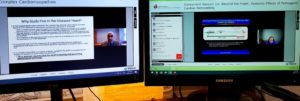A New Way To Participate
One of the characteristics of attending medium to large scientific sessions is the time-honored act of… running from room to room trying to catch glimpses of talks that interested you, but have of course ended up in different rooms, minutes apart. Many of us have done this, and to an extent, I don’t mind it! I can always count on being able to reach my daily step count targets whenever I’m attending a conference, without needing to set aside 30mins dedicated to a walk or morning run.
The current global health crisis has ushered in new and accelerated inevitable changes in the way science research is conducted, disseminated, and discussed within the community. Each one of these aspects has shown the malleable and highly valued ability for science, and society, to adapt to new paradigms of work. There have been many challenges and losses in the way research has been affected (a partial or total work-from-home status doesn’t translate to equal productivity for lab based work). But at the same time, this ongoing pandemic response has also provided a launching pad for some very innovative and future friendly adjustments.
Today I’ll focus on one of those changes, related specifically to conference attendance. This is by no means a novel idea, but I find myself thinking a lot about it, and I’d like to share some of those thoughts. Online based conferences have existed before Covid-19 became a house-hold idea and reality. Even more novel are Social Media “conferences”, an example being the Royal Society of Chemistry putting on the #RSCPoster Twitter Conference earlier this year (planned in early 2019, before covid).
The fact of the matter is, the movement to have scientific meetings and conferences be better adjusted within the online space has been gathering momentum for years. I for one, have served as “Twitter Ambassador” for a handful of conferences over the past couple of years, because conference organizers, participants, and various communities, have found tangible and positive effects of having conferences be more open, interactive, and far-reaching, beyond the walls of the hotel or center that brings together the in-real-life attendees.

(photo taken by Mo Al-Khalaf, 2020)
This year the Basic Cardiovascular Sciences headline annual meeting, better known this week as #BCVS20 is a fully virtual conference. As an early career molecular biologist researching mechanisms of heart disease, this is one of the “can’t miss” events on my calendar. My previous experiences for these type of conferences has been very rewarding, and advantageous in propelling my research and career. Before Covid-19, I was very much looking forward to this meeting scheduled to be in Chicago. When it was announced that the meeting will become fully virtual, I knew that there will be some experience that’ll get lost in the format change. But I also appreciated the diligent and effective leadership that made this call, because this was definitively the right call, for the safety of the attendees, and all the workers that would be involved in administering and pulling off a successful meeting (a meeting that brings 1000+ folks, in one building for a few days).
So far, I must say I find the #BCVS20 experience to be quite rewarding. It is different, and the limited and reformatted ways of networking and engagement takes a little bit of time to get used to. But overall, I believe there is great potential to make this format, or better yet, a hybrid format where both online and in-real-life parallel options available, a very appealing and appropriate next step in the evolution of how these types of meetings can be conducted. The ability to cater to a worldwide audience, and the convenience provided to allow attendees to participate and learn from field experts without the difficulty of planning a trip, is without a doubt an advantage to students and early career professionals, who do frequently face difficulties in attending such meetings.
One thing I note: Unlike past conference going experiences, I definitely need to put in the 30-minute daily jog before or after the day’s sessions… because there is no need to run from room to room to catch talks that you’re interested in… it’s all just a mouse click or head turn to a second screen away!
“The views, opinions and positions expressed within this blog are those of the author(s) alone and do not represent those of the American Heart Association. The accuracy, completeness and validity of any statements made within this article are not guaranteed. We accept no liability for any errors, omissions or representations. The copyright of this content belongs to the author and any liability with regards to infringement of intellectual property rights remains with them. The Early Career Voice blog is not intended to provide medical advice or treatment. Only your healthcare provider can provide that. The American Heart Association recommends that you consult your healthcare provider regarding your personal health matters. If you think you are having a heart attack, stroke or another emergency, please call 911 immediately.”